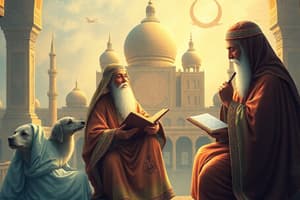Podcast
Questions and Answers
Which statement accurately reflects the relationship between Islam and other major religions?
Which statement accurately reflects the relationship between Islam and other major religions?
- Islam is older than Judaism but younger than Christianity.
- Islam is the oldest of the world's major religions.
- Islam is the most widely practiced religion globally.
- Islam is considered the youngest major religion, second largest to Christianity. (correct)
The Arabic term 'Allah' is best defined as:
The Arabic term 'Allah' is best defined as:
- The one and only God. (correct)
- The one who submits to God.
- A prophet in Islam.
- The community of believers.
Which of the following significantly influenced the development of Islam in its early stages?
Which of the following significantly influenced the development of Islam in its early stages?
- Shintoism and Animism.
- Confucianism and Taoism.
- Buddhism and Hinduism.
- Byzantine Christianity, Judaism, and Zoroastrianism. (correct)
The Sunni branch of Islam is best characterized by which of the following?
The Sunni branch of Islam is best characterized by which of the following?
What is the primary function of the Hadith in Islamic tradition?
What is the primary function of the Hadith in Islamic tradition?
The Islamic concept of Jihad is most accurately described as:
The Islamic concept of Jihad is most accurately described as:
The Quran is considered by Muslims to be:
The Quran is considered by Muslims to be:
Which of the following statements best reflects the Islamic perspective on terrorism?
Which of the following statements best reflects the Islamic perspective on terrorism?
What is the significance of uttering the statement 'There is no God but Allah; Muhammad is the messenger of Allah' in Islam?
What is the significance of uttering the statement 'There is no God but Allah; Muhammad is the messenger of Allah' in Islam?
What was the primary reason for Muslim migration from Arabian nations to the USA and European countries starting in the 19th and 20th centuries?
What was the primary reason for Muslim migration from Arabian nations to the USA and European countries starting in the 19th and 20th centuries?
Flashcards
Islam
Islam
The act of surrendering or submitting oneself for obedience to God, entering a state of peace and security with God through allegiance.
Muslim
Muslim
An Arabic term for a person who submits to God.
Allah
Allah
Arabic for 'The God'. Signifies the one and only God in Islam.
Sunni
Sunni
Signup and view all the flashcards
Shi'a
Shi'a
Signup and view all the flashcards
Sufi
Sufi
Signup and view all the flashcards
Quran
Quran
Signup and view all the flashcards
Hadith
Hadith
Signup and view all the flashcards
Jihad
Jihad
Signup and view all the flashcards
Converting to Islam
Converting to Islam
Signup and view all the flashcards
Study Notes
- Islam stands as the most recently established among major global religions, ranks as the second largest after Christianity, and is recognized as one of the fastest-growing religions worldwide
- Muslim refers to a follower of Islam
Origin
- The term "Islam" is derived from the Arabic word meaning "to submit" or "to surrender oneself for obedience to God" or "to enter into a condition of peace and security with God through allegiance and surrender to Him."
- Muslim is from the Arabic word for a person who submits and refers to a “person who surrenders or submits himself to obey God”
- In Arabic, Allah combines "al," the definite article, and "ilah," meaning God, signifying "the one who is God."
- Islam originated from the Arabian desert people around the early 7th century
- These people developed their own beliefs before Islam's formal establishment and had been influenced by Byzantine Christianity, Judaism, and Zoroastrianism
- Judea, a home of Christianity, was located near Arabia, with cities like Damascus, Antioch, and Alexandria neighboring Mecca and Medina
- Byzantine rulers' antagonism towards Arab Christians likely fueled their acceptance of Islam
- The Arab people were also familiar with Judaism, with several desert tribes being Jewish in origin
- In 622 C.E., Muslim forces entered Medina, with many Jewish citizens
- Muslims may have had contact with Persian Zoroastrians, though its influence was less than that of Christianity and Judaism
Divisions
- Islam has three major denominations:
- Sunni: The traditionalists and are considered the Orthodox of Islam
- Shi'a: The largest faction that separated from the rest of the community
- Sufi: Those whose concern mainly dwell for a mystical union with God
Sacred Texts
- Quran (or Koran): Literally meaning "recitation" or "reading," it is the sacred writing of the Muslims
- Hadith: The collected deeds and sayings of Muhammad and his followers and is considered the second source of Shari'a Law
Beliefs
- God has sent prophets, including Musa (Moses) and “Isa (Jesus), to call people back because of human rebellion and transgression
- Conversion requires stating, "There is no God but Allah; Muhammad is the messenger of Allah” with witnesses
- Affirming this declaration and accepting Islamic laws makes one part of the fastest-growing religion
Contemporary Issues
- Islam and Women: The role of women varies greatly within Islamic nations, with some experiencing restrictions and others emerging as leaders
- Jihad: Meaning "effort" or "struggle," it is to convince unbelievers and has become controversial due to Arab nations' varying commitment to war against non-Muslims
- Militancy and Terrorism: Muslims condemn terrorism because Islam advocates peace and mercy and violence against innocents violates its principles
- Migration: Muslims migrated from Arabian nations in the late 19th century and European countries encouraged migration from former colonies after WWII to increase manpower
Studying That Suits You
Use AI to generate personalized quizzes and flashcards to suit your learning preferences.




